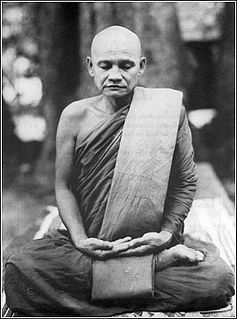Theravāda is the most commonly accepted name of Buddhism's oldest existing school. The school's adherents, termed Theravādins, have preserved their version of Gautama Buddha's teaching or Buddha Dhamma in the Pāli Canon for over a millennium.

Ayya Khema was a Buddhist teacher and was very active in providing opportunities for women to practice Buddhism, founding several centers around the world. In 1987, she helped coordinate the first-ever Sakyadhita International Association of Buddhist Women. Over two dozen books of her transcribed Dhamma talks in English and German have been published. In the last year of her life, she also published her autobiography: I Give You My Life.

Chah Subhaddo also known by his honorific name "Phra Bodhiñāṇathera" was a Thai Buddhist monk. He was an influential teacher of the Buddhadhamma and a founder of two major monasteries in the Thai Forest Tradition.
Muditā means joy; especially sympathetic or vicarious joy, or the pleasure that comes from delighting in other people's well-being.

Prajñā (Sanskrit) or paññā (Pāli), is a Buddhist term often translated as "wisdom", "intelligence", or "understanding". It is described in Buddhist commentaries as the understanding of the true nature of phenomena. In the context of Buddhist meditation, it is the ability to understand the three characteristics of all things: anicca (impermanence), dukkha, and anattā (non-self). Mahāyāna texts describe it as the understanding of śūnyatā. It is part of the Threefold Training in Buddhism, and is one of the ten pāramīs of Theravada Buddhism and one of the six Mahāyāna pāramitās.

Phra VisuddhisamvaratheraAM, known as Ajahn Brahmavaṃso, or simply Ajahn Brahm, is a British-Australian Theravada Buddhist monk. Currently, Ajahn Brahm is the abbot of Bodhinyana Monastery in Serpentine, Western Australia; Spiritual Adviser to the Buddhist Society of Victoria; Spiritual Adviser to the Buddhist Society of South Australia; Spiritual Patron of the Buddhist Fellowship in Singapore; Patron of the Brahm Centre in Singapore; Spiritual Adviser to the Anukampa Bhikkhuni Project in the UK; and Spiritual Director of the Buddhist Society of Western Australia (BSWA). He returned to the office on 22 April 2018 after briefly resigning in March, following a contentious vote by members of the BSWA during their annual general meeting.
The Buddhist Publication Society is a publishing house with charitable status whose goal and mission is to disseminate and propagate the teaching of Gautama Buddha. It was founded in Sri Lanka in 1958 by two Sri Lankan lay Buddhists, A.S. Karunaratna and Richard Abeyasekera, and a European-born Buddhist monk, Nyanaponika Thera. Originally conceived as a limited effort to publish small, affordable books on fundamental Buddhist topics, the Society expanded its scope in response to the reception of their early publishing efforts. Reflecting its Sri Lankan roots, the Buddhist Publication society's publications reflect the perspective of the Theravada denomination of Buddhism, drawing heavily from the Pāli Canon for source material.

Śāriputra was one of the top disciples of the Buddha. He is considered the first of the Buddha's two chief male disciples, together with Maudgalyāyana. Śāriputra had a key leadership role in the ministry of the Buddha and is considered in many Buddhist schools to have been important in the development of the Buddhist Abhidharma. He frequently appears in Mahayana sutras, and in some sutras, is used as a counterpoint to represent the Hinayana school of Buddhism.

The Abhidhamma Piṭaka is a collection of canonical texts in the Theravada Buddhist tradition. Together with the Vinaya Piṭaka and the Sutta Piṭaka it comprises the Tipiṭaka, the "Three Baskets" of canonical Theravada Buddhist texts.

Bhikkhu Bodhi, born Jeffrey Block, is an American Theravada Buddhist monk, ordained in Sri Lanka and currently teaching in the New York and New Jersey area. He was appointed the second president of the Buddhist Publication Society and has edited and authored several publications grounded in the Theravada Buddhist tradition.

The Dhammacakkappavattana Sutta is a Buddhist text that is considered by Buddhists to be a record of the first sermon given by Gautama Buddha. The main topic of this sutta is the Four Noble Truths, which refer to and express the basic orientation of Buddhism in a formulaic expression. This sutta also refers to the Buddhist concepts of the Middle Way, impermanence, and dependent origination.

The Ven. Nyanaponika Thera or Nyanaponika Mahathera was a German-born Theravada Buddhist monk and scholar who, after ordaining in Sri Lanka, later became the co-founder of the Buddhist Publication Society and author of numerous seminal books and articles on Theravada Buddhism. He mentored and taught a whole generation of Western Buddhist leaders such as Ven. Bhikkhu Bodhi.
Khema was a Buddhist bhikkhuni, or nun, who was one of the top female disciples of the Buddha. She is considered the first of the Buddha's two chief female disciples, along with Uppalavanna. Khema was born into the royal family of the ancient Kingdom of Madra, and was the wife of King Bimbisara of the ancient Indian kingdom of Magadha. Khema was convinced to visit the Buddha by her husband, who hired poets to sing about the beauty of the monastery he was staying at to her. She attained enlightenment as a laywoman while listening to one of the Buddha's sermons, considered a rare feat in Buddhist texts. Following her attainment, Khema entered the monastic life under the Buddha as a bhikkhuni. According to Buddhist tradition, the Buddha declared her his female disciple foremost in wisdom. Her male counterpart was Sariputta.

In Buddhism, symbolic offerings are made to the Triple Gem, giving rise to contemplative gratitude and inspiration. Typical material offerings involve simple objects such as a lit candle or oil lamp, burning incense, flowers, food, fruit, water or drinks.
In Buddhism, the bodhipakkhiyā dhammā are qualities (dhammā) conducive or related to (pakkhiya) awakening/understanding (bodhi), c.q. the factors and wholesome qualities which are developed when the mind is trained (bhavana).

Piyadassi Maha Thera is best known as a great preacher of the Dhamma both in Sinhala and in English and it was in this field that his popularity was foremost. He was born on 8 July 1914 at Kotahena in Colombo, Sri Lanka and was educated at Nalanda College, Colombo, thereafter at the University of Sri Lanka and the Center for the Study of World Religions at Harvard University as a research student.

Narada Mahathera, born Sumanapala Perera was a Theravada Buddhist monk, scholar, translator, educator and Buddhist missionary who was for many years the Superior of Vajiraramaya in Colombo, Sri Lanka. He was a popular figure in his native country, Sri Lanka, and beyond.
Most Ven. Kaṭukurunde Ñāṇananda Maha Thera was a Sri Lankan [Sinhala] Bhikkhu and Buddhist scholar. He is best known for the research monograph Concept and Reality in Early Buddhist Thought and the exploratory study The Magic of the Mind. Ven. Ñāṇananda was the abbot of Pothgulgala Aranya, a small forest monastery in Devalegama, Sri Lanka.

Bhikkhu Anālayo is a bhikkhu, scholar, and meditation teacher. He was born in Germany in 1962, and went forth in 1995 in Sri Lanka. He is best known for his comparative studies of Early Buddhist Texts as preserved by the various early Buddhist traditions.













